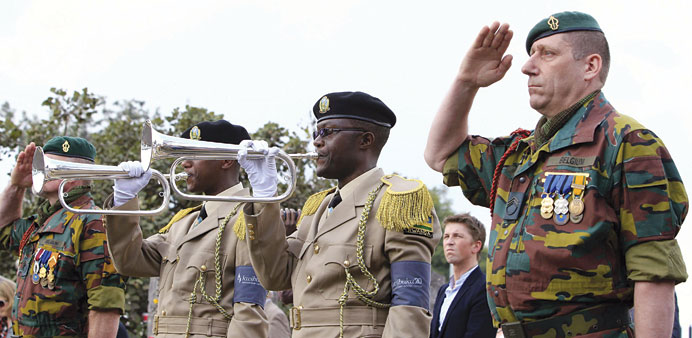AFP/Kigali
Emotional commemorations were held yesterday for a group of Belgian peacekeepers murdered at the start of Rwanda’s genocide 20 years ago, a brutal attack that contributed to a subsequent failure by the UN to halt the massacres.
Weeping families of the dead laid flowers in their memory at the site where the 10 commandos were shot dead in the capital - a bullet-scarred former military camp where they held out for hours against their attackers.
“They came to this country, far from home, to contribute to peace,” said Belgian’s Foreign Minister and Deputy Prime Minster Didier Reynders after embracing crying family members.
“They suddenly found themselves trapped in an explosion of hatred and violence.”
The brutal attack sparked bitter memories for the international community, reminding them of the chaos following the killing of 18 US troops in Somalia’s capital Mogadishu in 1993.
The UN was later heavily criticised for inaction in Rwanda, and UN Secretary-General Ban Ki-moon said on Monday during at commemorations marking the start of the genocide that the world body was still wracked by shame over its failure to act.
“It’s very painful,” said Beatrice Bassinne, widow of Captain Bruno Bassinne, who was killed in the attack.
“It’s been 20 years... but that is nothing at all as for us, it is still like it was yesterday,” said the greying widow, standing beside a stone pillar erected for her husband.
Other tearful family members touched the bullet holes still left in the walls from the fierce firefight as attackers overwhelmed the commandos, and put roses into cracks in the 10 stone pillars.
The fact the genocide was well planned, and that the deaths of the Belgians prompted remaining troops to withdraw, gave “free rein to the Rwandan genocide”, Bassine said. In total, at least 800,000 people were killed in 100 days of bloodshed.
The blue helmets, part of the UN Assistance Mission for Rwanda (UNAMIR), were ambushed a day after the genocide began late on April 6, 1994, shortly after Hutu president Juvenal Habyarimana was killed when his plane was shot down over Kigali.
The 10 peacekeepers were protecting Rwanda’s then-prime minister Agathe Uwilingiyimana, a moderate Hutu.
She was killed the same day, as roadblocks were set up and mostly Tutsi men, women and children of all ages were butchered with machetes, guns and grenades.
Belgium, Rwanda’s former colonial power, has previously apologised for its historic role in sowing the seeds of genocide through its division of Rwanda’s people into different groups.
Belgian Development Minister Jean-Pascal Labille repeated at the ceremony his country’s deep sorrow and regret at the “dereliction of duty of the international community and of too many politicians” during the genocide.
Meanwhile, a Norwegian court yesterday authorised the extradition of a man suspected of being involved in the Rwandan genocide two decades ago.
Eugene Nkuranyabahizi, 41, was arrested in Norway in May last year but has lived in the country since 1999.
Rwanda, which formally asked for his extradition in August, wants him to stand trial over allegations that he took part in the 1994 genocide.
The former teacher is accused of having participated in massacres in the areas of Nkakwa and Cyahinda, where some 7,500 people died in April 1994.
The suspect, who has Burundian citizenship, denies all the charges and opposes his extradition.
The district court of Stavanger in southwest Norway ruled that despite “several different explanations and observations” the allegations in the extradition request were based on “reasonable grounds”.
The court also judged that the suspect’s rights would be respected in Rwanda and that he would be treated fairly by the country’s legal system.
One of Nkuranyabahizi’s lawyers said his client intended to appeal the ruling.
“We disagree both with the legal considerations and the evaluation of evidence that was examined,” Brynjar Meling told Norwegian media.
“The court certainly noted a number of deficiencies and inconsistencies in the testimonies, but did not draw the right conclusions,” he said.
Last year Norway extradited Charles Bandora to Rwanda to stand trial for his alleged role in the genocide.
A court in Oslo also gave the highest possible prison sentence - 21 years - to another Rwandan, Sadi Bugingo, after he was found guilty of taking part in the slaughter of more than a thousand Tutsis in his home country.

A Belgian soldier salutes while his Rwandan counterparts blow bugles during a memorial service yesterday for 10 Belgian commandos killed at the onset
